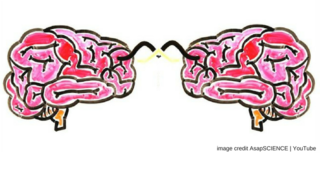Intuition
The Pit in Your Stomach Is Actually Your Second Brain
Gut feelings influence your mood and well-being.
Posted January 17, 2017 Reviewed by Ekua Hagan

The world is so much bigger and more interesting than we can see with our naked eyes. If we could, we could watch cells grow, morph, and split again over and over again on the backs of our own wrists—or the billions of foreign cells living in and among our own, forming what scientists are beginning to call our “second brain.”[1]
As researchers turn their microscopes to these hidden environments, they have discovered something remarkable: There’s an entire ecosystem of bacteria and a vast neural network operating in our guts. This ecosystem is our second brain, and comprises some 100 million neurons, more than the spinal cord. This is not a thinking brain—it does not reason, write poetry, or solve multi-linear regressions—but mounting evidence suggests that your gut’s health strongly influences your mood.
It’s not just that a stomachache can sour your day. It’s more than that. The enteric nervous system is a mesh-like network of neurons that lines the entire digestive tract. It causes the sensation of nervous butterflies or a pit in your stomach that are innate parts of our psychological stress responses. Up to 90 percent of the cells involved in these responses carry information to the brain rather than receiving messages from it, making your gut as influential to your mood as your head is. Maybe even more.
Even crazier is that our second brain is actually only half of us. Inside the digestive system, the enteric nervous system mainly communicates with bacteria. These are completely separate creatures that make up our microbiome, and there are just as many of them inside of us as our own human cells.[2]
Don’t panic: This is not an alien takeover. Our gut bacteria have evolved with us since birth. They help digest our food and fight off unfriendly outsiders like viruses and molds. To keep us healthy they need to be healthy and plentiful as well.[3] When they’re not, we feel it: This biomass of bacteria communicates with important neurotransmitters embedded throughout our enteric nervous system to send messages that influence the way we feel.
This could herald good news for those who suffer from anxiety or depression. Studies indicate that those with healthy and diverse gut microbes are less likely to suffer from either malady.[4] And many of us who grew up in too-clean environments, frequently took antibiotics, and ate junk food have a decidedly unhealthy microbiome. So changing one’s diet could well benefit far more than your waistline.
If you’ve seen the term “probiotics” recently, this is why. Probiotics are foods that nourish and promote your biome. They’re foods cultured with the strains of healthy bacteria. Yogurt is a perfect example of a cultured food.[5] Unfortunately, many grocery store yogurts are little more than a thickened, sweetened milk product. But yogurt that lists strains such as Lactobacillus acidophilus and Bifidobacterium lactis actually contain the healthy bacteria your gut needs. “Prebiotic” foods, meanwhile, support a healthy gut ecosystem in which your bacteria can thrive. Together, prebiotic and probiotic food help keep your second brain full of the vibrant bacterial community it needs to function.
How exactly these gut-healthy foods help manage depression is not yet totally clear. The science on the gut-brain connection is still young, especially as it relates to our mood. But studies continue to find promising correlations. There is evidence that a healthy gut can curb inflammation and cortisol levels, lower your reaction to stress, improve memory, and even reduce neuroticism and social anxiety.[6][7][8][9] Many of these preliminary studies were conducted on mice, but there’s little risk to conducting your own human test at home. Incorporate more gut-healthy foods into your diet like yogurt, sauerkraut, and dark chocolate, and see how you feel.
Yes, it’s unlikely that simply taking a sip of kombucha the next time you feel anxious will calm you much. And you can’t expect to replace your SSRIs with prebiotic pickles. As with most of medicine, the gut-brain connection is a complex, varied, and ever-changing system for which no one definition of “healthy” will do. Your gut is, after all, as unique as you are. But these emerging insights about our gut-brain connection make us reframe the way we think about—and treat[10]—our bodies and minds. If a cupful of yogurt for breakfast can make the workplace more bearable, then it’s time to go grocery shopping.
Check out this video from AsapScience for more about the second brain and its connection to everything from food cravings to autistic traits.
Follow @Cytowic, and see Dr. Cytowic on LinkedIn or at his website, Cytowic.net.
References
[1] Think Twice: How the Gut's "Second Brain" Influences Mood and Well-Being.
[2] How Many Bacteria Versus Human Cells Are in the Body?
[3] Missing Microbes: How the Overuse of Antibiotics Is Fueling Our Modern Plagues.
[5] Confusion At The Yogurt Aisle? Time for Probiotics 101.
[6] The Gut Microbiome and the Brain.
[7] Gut Feelings: Bacteria and the Brain.
[8] Bifidobacteria modulate cognitive processes in an anxious mouse strain.
[9] It’s not all in your head — it’s in your gut, too.
[10] Bacterial neuroactive compounds produced by psychobiotics.




